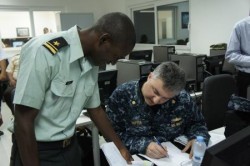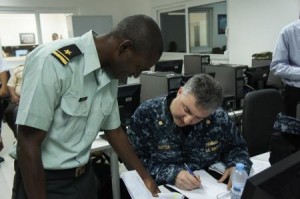
The think-tank C4ADS recently published a new study, The Odessa Network: Mapping Facilitators of Russian and Ukrainian Arms Transfers, which analyzed commercial maritime networks linked to the Russian state and their involvement in arms shipments, particularly those to Bashar al-Assad’s forces in Syria fighting in that ongoing Civil War.
The report received some additional publicity when it formed the meat of a 7 September Washington Post story, with discussion especially devoted towards the report’s analysis of Automatic Identification System (AIS) data, claiming that vessels likely carrying arms from the Ukrainian port of Oktyabrsk were turning off AIS when traveling to Syria.
The analysis conducted by Tom Wallace and Farley Mesko is certainly interesting and provides an in-depth look at commercial maritime networks and practices not generally seen outside of specialist literature on the shipping industry. The work does leave some questions unanswered and makes unwarranted conclusions based on the available data, however:
- The piece goes into great detail to lay out the various networks that Russia uses to ship arms, composed of interlocking companies headed and/or controlled by individuals with links to the state. What’s unclear is why that should be considered unusual or bad. Shell companies, convoluted ownership, and Flags of Convenience are commonplace for a variety reasons (many business-related) in the maritime industry. It is not much of a “So What” to reveal that cronies in the maritime industry would be the facilitators used by Putin’s Russia to ship weapons to a pariah state. (Of note for those interested in topics like Flags of Convenience, Rodney Carlisle’s Sovereignty for Sale is a good read which explains the creation of the famous Panamanian and Liberian registries and provides context on why ship “ownership” is rarely straightforward in the maritime industry).
- Russian arms shipments to Assad’s forces in Syria are clearly “bad,” but the implication in the Odessa Network study is that not only is Russia doing something bad, but that they are also doing it in a particularly devious and underhanded way. The data provided by Wallace and Mesko only proves, however, that Russia is choosing to use “discreet” means to ship weapons to Syria. It’s not clear that the Odessa Network’s ties to the Russian state or its business practices are that particularly egregious or unusual within the maritime industry.
- The authors look at both publicly available data regarding Russian arms shipments as well as AIS data. According to available data for ships/shipments, they note that “publicly known maritime weapons shipments from Russia to Syria” departed from “northern Russian ports of St. Petersburg or Kaliningrad.” They then claim, however, based on the curious absence of AIS data for Russian ships in the eastern Mediterranean originating in Oktyabrsk, that there is “a strong circumstantial case that these ships and companies are moving weapons or other sensitive cargo to the Assad regime.” The argument is inconsistent. On one hand they make a case that operational security concerns or potential EU pressure on the Ukrainian government is stopping the use of Oktyabrsk as a transshipment site for Syria-bound arms, while on the other hand claiming that nefarious Russian intent is demonstrated by ships originating in Oktyabrsk deliberately not broadcasting AIS data when traveling to Syria. Can both these assertions be true at the same time?
- While certainly suspicious, is it actually illegal to turn off AIS as these Russia ships have allegedly done? The authors point out that there is the possibility that data may not be available in certain locations due to a lack of receivers, but also note that the eastern Mediterranean is not exactly an isolated area, and that AIS on these ships seems to work quite well everywhere else in the world. According to the UN’s International Maritime Organization (IMO), “all ships of 300 gross tonnage and upwards engaged on international voyages, cargo ships of 500 gross tonnage and upwards not engaged on international voyages and all passenger ships irrespective of size” shall “maintain AIS in operation at all times except where international agreements, rules or standards provide for the protection of navigational information.” These rules were implemented as part of the International Ship and Port Facility Security (ISPS) Code, as part of the International Convention for the Safety of Life at Sea (SOLAS). Although there is no real chance that these rules could be enforced against Russian ships since they are adopted and enforced by IMO member states themselves, are these ships doing something illegal by not using AIS properly? Could operators of these vessels be subject to penalties? Could enforcement of these rules be a round-about way to stop Russian arms shipments to Syria?
Despite my minor criticism above, this sort of analysis is welcome and could be applied to a variety of other maritime issues. More publicly available detailed network analysis of the commercial networks benefiting from oil theft in West Africa or Somali piracy could provide new, non-kinetic policy or law enforcement options in the fight against these illicit activities afloat. Similarly, the methods toward which Iran has been driven by sanctions to facilitate its oil exports could be a useful subject of interest to analysts and policy-makers alike.
Lieutenant Commander Mark Munson is a Naval Intelligence officer currently serving on the OPNAV staff. He has previously served at Naval Special Warfare Group FOUR, the Office of Naval Intelligence, and onboard USS ESSEX (LHD 2). The views expressed are solely those of the author and do not reflect the official viewpoints or policies of the Department of Defense or the US Government.





